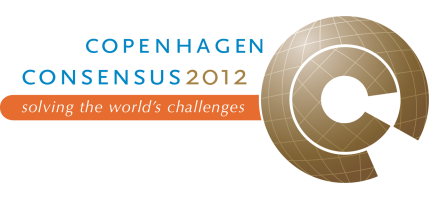Testimonials
The Copenhagen Consensus 2012 is a valuable contribution to the development debate, particularly given its focus on getting the best value for money and greatest impact from aid DFID’s program priorities are closely aligned with the recommendations from the Copenhagen Consensus. I find the analysis compelling, and I have been working with the Consensus since 2004.
- Stephen O'Brien, UK Parliamentary Under-Secretary of State for International Development
This is a stimulating intellectual game with important real-world consequences. Lomborg asks all of us to stop talking grandly and vaguely about solving global problems and instead to rank them - based not only on the potential harm they can cause but also on our ability to turn things around. To govern is to choose and this pithy book forces us to choose.”
- Fareed Zakaria, Newsweek columnist and author of The Future of Freedom
The world's staggering problems won't be solved by singing pop songs, denouncing villains, or adopting the proper moral tone, but by figuring out which policies have the best chance of doing the most good. If the world is going to become a better place, it will be because of the kinds of thinking on display in this courageous and fascinating book.”
- Steven Pinker, Professor, Harvard University, and author of How the Mind Works and The Blank Slate
This book helps you make up your own mind, prioritize, and make your own choice. Just in time.”
- Kevin Roberts, CEO Worldwide, Saatchi & Saatchi, and author of Lovemarks: The Future Beyond Brands
Bjorn Lomborg and his economist colleagues have produced a fascinating and unexpected consensus, which can start a debate about global priorities: Should we prioritize a costly and uncertain attempt to reduce effects of global warming in a hundred years’ time while millions are dying for lack of mosquito nets or condoms?”
- Matt Ridley, author of Nature via Nurture
This small volume reflects an admirable undertaking, gracefully explained for those interested in guarding the future“
- Publishers Weekly
Lomborg's Copenhagen Consensus Center has posed a challenging question: If we had an additional $50 billion to spend on mitigating global problems, how should we spend it? To suggest answers, the center convened a panel of eight distinguished economists to evaluate proposals by over two dozen specialists on problems ranging from AIDS and malnutrition to water shortage, civil war, climate change, and migration, among others. Their collective recommendation: focus on AIDS prevention, the provision of micronutrients to poor children, trade liberalization, and the control of malaria. Their choices were determined by the expected payoff, largely but not wholly in economic terms, that each of these programs could generate relative to its cost. Some issues, such as civil war, could not be evaluated in general terms and so were not ranked. The motivating principle of the exercise was that resources are limited, political leaders must make choices, and those choices should be governed by where the most good can be done for humanity -- especially for those who are so poor that they cannot look beyond where their next meal is coming from."
- Foreign Affairs
Great book title and a thought-provoking exercise, whether or not one agrees with the worldview and methods of economists.“
- Future Survey

